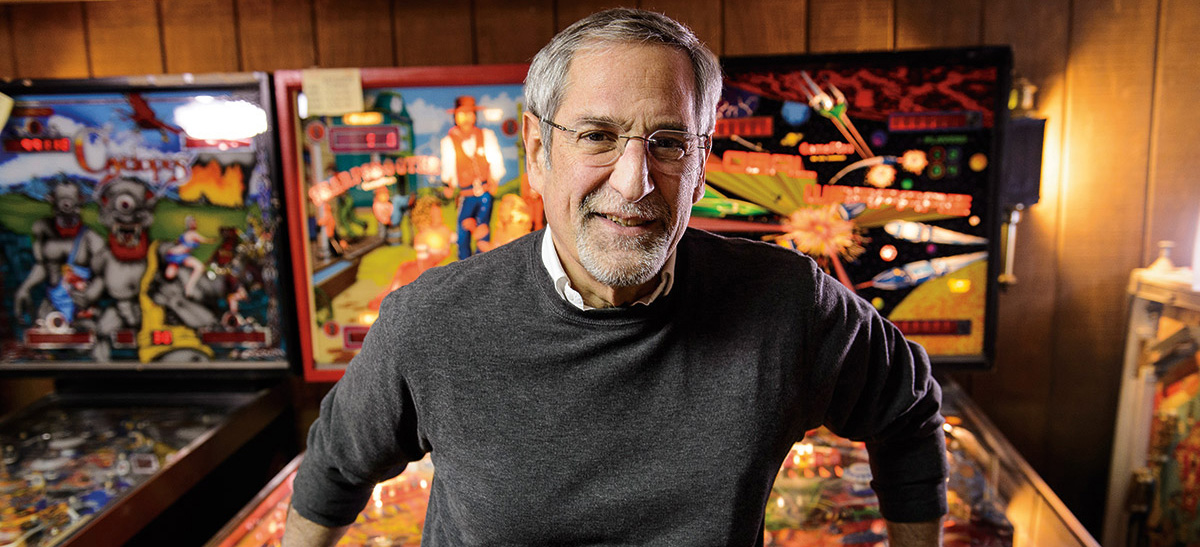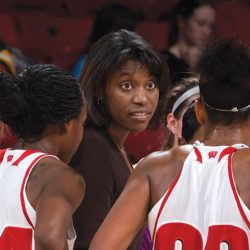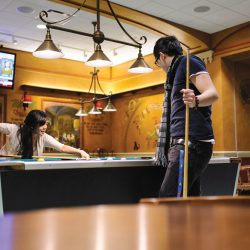
The Man Who Saved Pinball
Roger Sharpe wrote the definitive book on the game and made playing it legal again.
When I arrive at GameWorks arcade in Schaumburg, Illinois, Roger Sharpe ’71 escorts me upstairs, sets up a two-player game on an Iron Man pinball machine, and tells me to go first.
My turn is over before I can turn around to see if he’s laughing. It could be a while before I play again. After all, this is the man who saved pinball.
“The big thing with pinball is understanding the geometry of the game, the sequences,” he says, describing a game that has evolved since the eighteenth century. In today’s version, players hit a steel ball with “flippers” on a decorated board. He starts calling his shots, drawing paths on the glass with his finger. “See? I’ll hit up the right lane now.”
Calling his shots is what Sharpe is known for. In 1976, as the New York City Council reexamined the city’s ban on pinball as gambling, Sharpe testified that the game involves more skill than luck. After he successfully called several shots on a machine of the council’s choosing, the officials had seen enough. They voted unanimously to lift the ban, and then-mayor Abraham Beame signed it into law. “So I’m now a historical footnote,” Sharpe says.
Before he became a star in the pinball world, Sharpe studied marketing at the UW, where he and his Alpha Epsilon Pi fraternity brothers would kill free time playing pinball at hangout spots such as The Pub or the old Kollege Klub. The turning point, Sharpe says, came as he watched a friend expertly balance a burger, fries, soda, and a cigarette as he played.
“He was controlling everything,” Sharpe says. “It was an epiphany of sorts.”
After graduation, Sharpe moved to New York, taking an editor position at GQ magazine. His desire to play pinball, which had been banned in the city since 1942, led him to pursue a feature story that eventually evolved into a book, Pinball!, establishing him as the expert who could save the game. After his famous testimony and time at GQ, the Chicago native returned to Illinois, working in the gaming industry for twenty-six years. Today he leads his own company, Sharpe Communications, which specializes in the design, marketing, and promotion of gaming systems.
After my defeat on the Iron Man machine, Sharpe moves down two places to a game that’s based on the television series 24. He starts slowly, but soon seems unaware that anything else exists outside of the game. One ball seems to become dozens, dancing around under the glass in controlled chaos.
When his three turns are up, he’s set the new high score on that machine. He turns around with a knowing grin and shrugs. “I showed off a little bit,” he says. “I got caught up in the moment.”
He still plays competitively, and his sons have followed his lead. Zach and Josh Sharpe are ranked fifth and eighteenth worldwide, according to the International Flipper Pinball Association (IFPA), and they compete often in tournaments sponsored by IFPA and the Professional and Amateur Pinball Association, which their father cofounded. Despite a very early influence — Sharpe recalls rocking them to sleep as infants in one arm while he played an Evel Knievel game with the other — he says he never expected them to pick up where he left off. People have since joked about them as the “first family of pinball.”
As our time together comes to a close, I ask Sharpe if he worries that pinball will fall by the wayside as new technologies such as virtual reality gain attention.
“It’s not going to disappear,” he says firmly. “I’ve said it before: if anybody can offer me something that provides the same type of entertainment experience as pinball, tactilely, sensorially, in every which way, then I’ll consider it. But until then, pinball is pinball. It’s that incredible wonderland under the glass.”
Daniel McKay X’16 serves as editorial intern for On Wisconsin.
Published in the Spring 2016 issue















Comments
No comments posted yet.